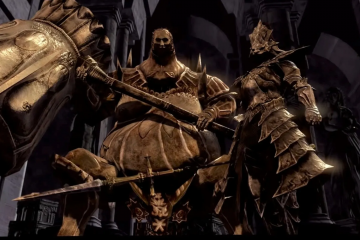The following is an episode of The Drawing Board, a podcast by With a Terrible Fate that highlights the unstructured conversations about video games from which our analytical content is derived.
Welcome to Episode 10 of The Drawing Board, a podcast by With a Terrible Fate.
Terms like “immersion” might seem like a great way to have productive conversations about video games—but they’re actually holding us back. In this episode, I sat down with Dan, the head of our Video Game Canon series, to consider the two reasons why this is the case.
Reason #1:
One of the foundational principles that underpin all the video-game studies we conduct on With a Terrible Fate is analytical rigor: above all, we strive to clearly define the terms that we use in our arguments and make it crystal-clear to our audience (and to ourselves!) how we’ve come to draw our particular conclusions about video games.
This can put our analysts in an awkward position at times because it leads me to dismiss widespread video-game terms—terms like ‘immersion’—as nonsense. If an analyst sends me an article draft that says something like “this particular gameplay sequence is extremely immersive,” I will highlight that sentence and tell them that I don’t know what it means.
That’s a fairly counterintuitive perspective: as people who want to encourage thoughtful discourse about the storytelling of video games, shouldn’t we embrace the terminology that people everywhere commonly use to discuss that storytelling?
Well, no, and this is why: terms like ‘immersion’ are ambiguous and can refer to a range of distinct concepts. When we let our discussion of video-game stories begin and end with these buzzwords, we ignore those subtler concepts that give us the chance to understand and appreciate video games in a richer, more sophisticated way.
Case in point: during this podcast episode, Dan and I identified no fewer than five different things you could mean when you call a game “immersive.”
Reason #2:
There’s another reason why immersion specifically is damaging nowadays: nebulous as the term is, many gamers, developers, and publications see it as directly related to a game’s quality. The more “immersive” a game is, these people contend, the better its storytelling is; the less “immersive” a game is, the worse its storytelling is.
Much of our work on With a Terrible Fate demonstrates that this notion is completely misguided.
Over the years, we’ve analyzed many games that distinguish themselves as exceptional stories precisely because they do not “immerse” the player in their world: rather, they reinforce the player’s separateness from their world by embuing that separateness with distinct narrative value. This, we’ve shown, is the principle behind the success of storytelling masterworks like:
- The science fiction of BioShock Infinite
- The dream narrative of Bloodborne
- The plot of Fire Emblem: Awakening
- The metaphysics of Xenoblade Chronicles
- Everything about Majora’s Mask
We’re unfairly primed to write off the value of such stories if the vague notion of “immersion” is held up as the paragon to which gaming aspires.
Why are terms like ‘immersion’ misleading at best and analytically impotent at worst? How can we strive to do better in our everyday conversations about gaming?
Listen in, and find out.



